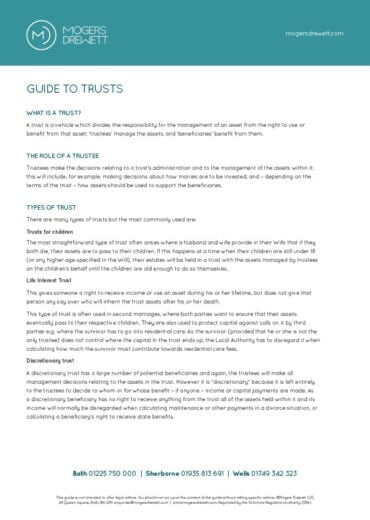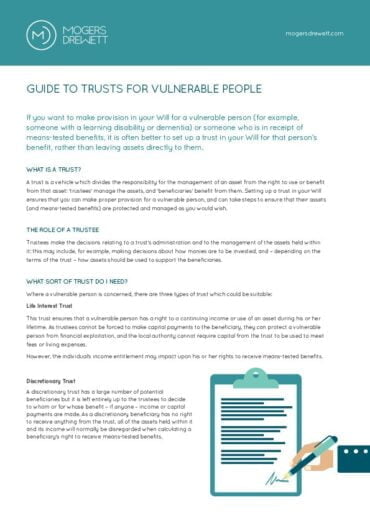Trust administration solicitors
Trusts are used for several reasons, for example to protect assets or to provide protection for vulnerable people. But they are also a tax-efficient way of sharing wealth between the generations and lowering your inheritance tax (IHT) liability.
Trusts can be set up during your lifetime, where you can act as the trustee and control what happens to the assets you have gifted. They can also be set up in your Will to deal with the protection of assets after your death. There are several different types of trust that can be used depending on the amount and type of assets in the trust and how it will be used.
Our team of trust experts can help with:
Trust administration
Trustees have a duty to ensure that a trust is managed appropriately and effectively. If the trustees fail to ensure that the administration is kept up to date they could be personally liable for any failings.
Our dedicated team of trust administrators can help with the day-to-day running of trusts to ensure that does not happen. Our services include:
- Drafting annual trust accounts and completing annual trust tax returns
- Calculating income or capital gains tax due
- Arranging the annual trustees review meetings
- Liaising with the investment manager to ensure that they are managing the trust investments appropriately
- Managing any other trust assets, including properties
- Liaising between you and the trust beneficiaries regarding their entitlements and the performance of the trust assets
- Advising on inheritance tax charges including the 10-year anniversary charge and other periodic charges
- Acting as a central point of contact between any other professionals involved in the management of the trust, including accounts, investment managers and land agents
- Dealing with obligations associated with trust compliance including Foreign Account Tax Compliance Act (FATCA) and the new rules surrounding registering your trust
Trust registration
Before 1 September 2022, only tax-paying trusts needed to formally register with HMRC. The introduction of the Fifth Anti-Money Laundering Directive (5AMLD) on the 10th January 2020 significantly extended the scope of the Trust Registration Service (TRS).
The Trust Registration Service (TRS) is an online facility for registering trusts and notifying HM Revenue & Customs (HMRC) of changes in circumstances in order to comply with anti-money laundering regulations.
If you are a trustee, then you are responsible for registering your trust with the TRS.
For trusts created after 1 September 2022, you will have 30 days to register with the TRS. Once a trust is registered, trustees have 30 days to notify HMRC of any changes.
If you are not sure whether your trust needs to be registered, contact our trust administration experts. They can confirm if it needs to be registered and register it on your behalf to avoid any penalties from HMRC.
Next steps: get in touch
If you feel as though a trust would benefit you and your family or if you would like us to manage the registration or ongoing administration of trusts, contact our team of experts on: 0800 533 5349 or enquiries@mogersdrewett.com
Meet the team
Frequently asked questions
Put very simply, a trust is a way to protect your assets and can help to reduce you inheritance tax liability, which in turn allows you to pass more of your assets on to your loved ones.
Potentially, yes. By placing your assets into trust, the assets are controlled by the trustees. This could override the need for probate, allowing the estate to be paid directly to a beneficiary.
Trust administration relates to the day-to-day management of a trust. Trustees have a duty to ensure that the trust is managed appropriately and effectively. If the trustees fail to do this then they could be personally liable for any failings.
The introduction of the Fifth Anti-Money Laundering Directive (5AMLD) on 10 January 2020 significantly extended the scope of the Trust Registration Service. It is now estimated that up to ten times as many trusts will need to be registered, including small or non-tax-paying trusts. If you don’t register your trust, you could risk a fine from HMRC, so if in doubt talk to the team today. Read our Guide to Trust Registration
There are some trusts that will continue to be exempt from registration, but the list is small. The trusts that continue to be exempt include:
- Life policies that are held in trust
- Charitable trusts, which are registered as a charity in the UK, or which are not required to register as a charity
- Co-ownership trusts set up to hold shares of property or other assets, which are jointly owned by two or more people for themselves as ‘tenants in common’
A life interest trust gives a named individual the use of assets held in the trust for his or her lifetime.
A discretionary trust names a number of people who can potentially benefit from it, but it is entirely up to the trustees to decide which of those people gain from the trust and to what extent.









